Pascal's Wager

Interview by Richard Marshall

'Pascal’s wager is often, at least at first blush, framed in terms of what you should believe. So, should you believe that God exists? Here’s a simplistic version of the wager: Well, if you believe in God and God exists, you’ll go to heaven, which is infinitely good. If God exists and you don’t believe in God, you may go to hell, which is infinitely bad. If God does not exist, then whether you believe in God or not, whatever you gain or lose would be finite. Thus, given this cost-benefit analysis, you should believe in God.'
'Atheists, agnostics, and theists all seem to be rational, even when aware of the same (or similar) evidence that bears on God's existence. For some questions, like whether the earth is flat, there is disagreement but one side clearly has an epistemic advantage. The disagreement over theism isn’t like this—one side doesn’t obviously have an epistemic “leg up” over the other.'
' Belief-credence dualism is the view that we have both beliefs and credences, and neither attitude reduces to the other. Epistemic akrasia occurs when someone believes something but also thinks that belief is irrational. Peter Tan and I consider a specific case of epistemic akrasia in which a person named Taylor believes her close friends and family think ill of her. However, at the same time, she knows she shouldn’t believe this, as her only evidence for this is that she hasn’t been in touch with them, and this is because she just moved to a new country to start a demanding job. She thus has a low credence that her family and friends think ill of her. However, she cannot shake the belief. '

Liz Jackson's primary research is in epistemology, much of it falling at the intersection between formal and traditional epistemology. Recently, her research has focused on the relationship between belief and credence. Her interests in epistemology also include (defending) epistemic permissivism, (arguing against) pragmatic and moral encroachment, and other issues in social epistemology (e.g. disagreement, epistemic paternalism). Her secondary research interests are in philosophy of mind, specifically the nature of belief, and philosophy of religion, specifically Pascal’s Wager and the nature of faith. Here she discusses the intersection of traditional and formal epistemology, Pascal's wager, the objection that wagering is impossible, the objection that wagering is epistemically impermissible, why the objections fail, the relationship between taking Pascal’s wager, faith, and hope, credences and whether they're beliefs, attitude types, whether God would have beliefs, credences or both, moral encroachment, ‘belief-credence dualism’, the relationship between credence, belief and evidence, whether religious beliefs going way beyond evidence can still be rational, and divine hiddenness.
3:16: What made you become a philosopher?
LizJackson: I went to undergrad at Kansas State, and I was one of those college students that changed my major a bunch. I tried math, political science, and several other majors. In this process, I decided to take a philosophy class to try it out. I was sold, almost immediately. I realized that philosophers were the ones asking the questions I’d always been interested in. I declared a philosophy major right away. I loved philosophy, and once I found out grad school was fully funded, decided to give it a shot. Notre Dame had always been a top choice, as it was really good for my interests in epistemology and philosophy of religion, so I was super happy when I was accepted there.
3:16: You’re interested in the intersection of traditional and formal epistemology. Before we start perhaps you could sketch for the uninitiated what this distinction is, and why the intersection is philosophically interesting?
LJ: Epistemology is the study of knowledge and rational belief. I actually got interested in this distinction, in part, because of the different ways Kansas State and Notre Dame approached epistemology. At Notre Dame, belief is normally viewed as a binary thing—for any proposition, you believe it, you withhold belief on it, or you disbelieve it. For example, I believe that 1+1=2 and that it is very hot today, I withhold belief that there are an even number of stars, and I disbelieve that the pile of laundry next to me is folded.
People at Notre Dame also seemed to talk and care more about knowledge—which makes sense, as belief—in this binary sense—is often taken to be a part of knowledge. This is often called “traditional” (or as my friend Paul Blaschko calls it, casual) epistemology. But notice that, even though I believe that 1+1=2 and that it is hot today, I’m more confident in the former than the latter. To capture this, some people—like those at Kansas State—approach epistemology in a more “mathematical” way. They measure belief on a scale from 0 to 1, where 0 is certainty something is false, and 1 is certainty something is true. You could think of these as levels of confidence—often called credences. So, my credence that 1+1=2 is 1, but my credence that it’s extremely hot today is 0.95. We can then think about what makes credences (ir)rational, how we should change our credences when we encounter new evidence, the role credences play in rational decision making, etc. This is often called “formal” epistemology.
This got me thinking—there are these two research programs, both call themselves epistemology, but both are so different! So I decided to explore this relationship in my dissertation. I ended up taking an ecumenical approach, attempting to preserve the value in both strands of epistemology; we’ll get into the details of that later.
3:16: Pascal’s wager is roughly about hedging your bets so that you stick with God just in case it’s true, because you lose more if it’s true than if it’s not. You look at two objections to this strategy - the objection that wagering is impossible, and the objection that wagering is epistemically impermissible. Can you first say what the objections in their strongest form look like?
LJ: Absolutely. Pascal’s wager is often, at least at first blush, framed in terms of what you should believe. So, should you believe that God exists? Here’s a simplistic version of the wager: Well, if you believe in God and God exists, you’ll go to heaven, which is infinitely good. If God exists and you don’t believe in God, you may go to hell, which is infinitely bad. If God does not exist, then whether you believe in God or not, whatever you gain or lose would be finite. Thus, given this cost-benefit analysis, you should believe in God. But the focus on belief seems to raise two problems. The first, which I call the impossibility objection, is the view that you cannot believe in God (and perhaps cannot form beliefs more generally) based on a cost-benefit analysis like this. Suppose I offer you a large sum of money if you believe that 1+1=3. Even if you care much more about the money than the belief, it intuitively seems like you cannot form that belief just to get the money. The second, the irrationality objection, goes as follows: look, even if you can somehow psychologically manipulate yourself into forming beliefs based on a cost-benefit analysis, those beliefs will definitely not be rational! Rational belief is based on evidence or truth-related factors, and simply because a belief has benefits doesn’t mean it is more likely to be true. So, at best, Pascal’s wager gets you an irrational belief. Of course, one way out of these objections is to make the wager about how you should act (for example, whether you should commit to God) rather than what you should believe (Pascal himself arguably took a route like this), but I think it’s interesting to consider whether we can respond to these objections even if wagering involves believing.
3:16: So you want to push back against these objections using what you call epistemic permissivism - the thesis that the evidence can rationally permit more than one attitude toward a proposition. Before taking us through your push back arguments, why do you think if permissivism is true then it’s true about theological beliefs?
LJ: Three main reasons—I’ll focus on theistic belief. First, debates about God’s existence have a long history, with powerful evidence on both sides. The question of whether God exists is as old as philosophy. On both sides, the arguments have been presented, objected to, reframed, objected to again, responses given… the process continues. Second, there is widespread disagreement about God’s existence. While there are more theists than atheists in the overall world population, among professional philosophers, the majority are atheists. But then, among philosophers of religion, the majority are theists. There seem to be smart, well-informed people on both sides of the debate. Finally, atheists, agnostics, and theists all seem to be rational, even when aware of the same (or similar) evidence that bears on God's existence. For some questions, like whether the earth is flat, there is disagreement but one side clearly has an epistemic advantage. The disagreement over theism isn’t like this—one side doesn’t obviously have an epistemic “leg up” over the other.
3:16: So why don’t the objections work?
LJ: Right. So suppose I’m right that many of us are in an epistemically permissive situation regarding theism. Then, (1) we actually have a lot more control over our theistic beliefs and (2) theistic beliefs formed for practical reasons can be epistemically rational. Or so I argue. While I can’t give a full explanation here, in a nutshell: for (1), many of the intuitive cases that motivate the impossibility objection focus on believing claims that are obviously true or false. Sure, I can’t believe 1+1=3 for money but 1+1=3 is just obviously false, given my evidence. But what if multiple attitudes are epistemically on a par for me, such that either would be rational given my evidence—maybe both are roughly equally good explanations of my evidence? Then, it’s much less clear that I couldn’t believe at will—and in fact, pick the attitude that is more practically beneficial.
For (2), it’s far from obvious that beliefs formed in this way would automatically be irrational; in fact, we’ve stipulated that the attitude I end up with is a rational response to my evidence. Thus, even if practical factors play a role—breaking the “epistemic tie”, so to speak—the resulting belief could still be epistemically rational, as it is rationally permitted by my evidence. (I know this was quick—see my recent Erkenntnis paper for an expansion on these arguments! I should also note that there are several other objections to the wager, such as the classic many-gods objection, that I respond to in other work.) One interesting thing that comes out of this is that, even if theism and atheism are epistemically symmetrical, they might be pragmatically asymmetrical.
3:16: And sticking with Pascal’s wager, what’s the relationship between taking Pascal’s wager, faith, and hope. On the surface it looks like a hard-nosed calculating cynics approach?
LJ: Good. So another objection to Pascal's wager is that, even if you can wager, and wagering is rational in the relevant sense, it seems like there’s something bad—maybe morally bad, or unvirtuous—about making a religious commitment based on a cold calculation. Along similar lines, you might worry that there’s something “selfish” about taking the wager, or that people wager merely out of fear of hell, all of which seem like questionable motives. I have a paper-length response to this objection, too.
First, a concession: it’s surely possible to wager with bad motives. That said, I try to carve out a natural way of taking the wager that doesn’t reflect poor or selfish motives, and in fact, demonstrates genuine faith (or hope) that God exists, both of which are commitment-justifying theological virtues. To do so, I first argue that the wagerer I have in mind is motivated by the goodness of the outcome where they believe in God and God exists. They realize that, if God existed—a powerful, good being who created the universe—God is someone they would want to pursue and commit to. Thus, even the possibility that God exists provides a strong reason to pursue a relationship with God, because knowing such a being would be so incredibly valuable. I go on to argue that this wagerer actually fulfills the conditions for having faith, given a common view of faith, or if their credences are too low to have faith, they nonetheless hope that God exists.
3:16: Philosophers talk about beliefs and credences and I always thought credences were a species of belief. Are credences beliefs and why is it important to know whether they are independent or not? You seem to be saying they are beliefs but yet are independent. Is that right?
LJ: Good question. To back up very quickly, there are three main views about the relationship between belief and credence: the credence-first view, on which beliefs reduce to high credences, the belief-first view, on which credences reduce to something like a probability-belief (a 0.9 credence it will rain tomorrow is the belief “the probability it will rain tomorrow is 0.9”), and dualism, on which neither belief nor credence reduces to each other. While I’m a dualist, the confusion is understandable, because in a co-authored a paper with Andrew Moon, we defend the belief-first view from a series of common objections. While I don’t ultimately hold the belief-first view, I do think it’s often dismissed too quickly, and that people should give it more of a chance. It’s nice to hear that you’re sympathetic to the belief-first view—Andrew Moon will be happy to hear that!
Why is the relationship between belief and credence important? Well, here are two reasons. The first we discussed previously: it sheds light on the relationship between formal and traditional epistemology generally. If beliefs (or credences) are the fundamental attitude, this suggests that there might be something more joint-caving or fundamental about traditional (or formal) epistemology. If dualism is right, then the subfields might be equally fundamental, and somewhat independent, research programs—but this still raises the important question of how they relate to each other.
3:16: Epistemology is concerned with several controversies, such as permissivism, disagreement, pragmatic encroachment, doxastic voluntarism, and the relationship between doxastic attitudes and prudential rationality. Why do attitude types matter in trying to work out the best accounts of these epistemic controversies?
LJ: A lot of debates in epistemology—including the ones you mention—can be framed in terms of belief, credence, or both. Let’s take disagreement as an example: should we change our opinion when we encounter a disagreeing peer, as so-called conciliationism suggests, or are we within our rights to have strong opinions about controversial matters, as so-called steadfastness suggests? Well, notice that “opinion” is ambiguous between beliefs and credences. And, without saying anything about the relationship between belief and credence, simply because we ought to adjust (or not adjust) one attitude, doesn’t mean the same holds for the other. On the other hand, a prior commitment to the belief- or credence-first view, or to dualism, has implications for these debates—for instance, if you hold a credence-first view and conciliationism about credence, and a disagreement requires you to lower credence below the threshold for belief, then you should also conciliate with your belief. Both the attitude in question and the relationship between belief and credence have implications for many debates in epistemology generally.
Similar considerations apply to permissivism (does our evidence permit more than one credence, belief-attitude, both, or neither?) pragmatic encroachment (does the practical encroach on rational belief, rational credence, both, or neither?), doxastic voluntarism (do we have voluntary control over our beliefs, our credences, both, or neither?), and prudential rationality (which attitude plays a key role in rational decision making?). This is another reason the relationship between belief and credence is important.
3:16: On this basis would God have beliefs, credences or both?
LJ: This is a fun question! Justin Mooney and I survey some of the considerations in favor of multiple views here, and I think more work should be done on God’s mental states. However, my favorite view is that God’s beliefs reduce to God’s credences of 1. That is, God believes p iff and because God has a credence of 1 in p. Two reasons for this: the common objections to the belief-as-credence-1 view don’t apply to God, as these worries are often based on a thinker’s cognitive or epistemic limitations. Second, on this view, God could have non-extreme credences (as open theism suggests), without risking having a false belief (since God would only believe p if God’s credence in p was 1). That said, I also think the knowledge-only view is interesting: the view that God doesn’t have beliefs or credences, but a kind of knowledge-by-acquaintance that doesn’t require any kind of mental representation. William Alston defends this view, and my co-author Justin also holds it.
3:16: Given your distinction between credence and belief why don’t you agree that radical moral encroachment doesn’t impact on salient beliefs in the same way as on credences? Why don’t claims of asymmetry here work for you?
LJ: Moral encroachment is the view that moral factors can affect the epistemic rationality of a belief. For example, if your spouse comes home from a holiday party with a wine stain on her shirt, in normal circumstances, it seems rational to believe she had a glass of wine at the party. However, if your spouse is a recovering alcoholic who has been sober for several months, you shouldn’t believe she had a glass of wine at the party, even if your evidence is the same. This is because in the second case, the moral stakes are higher, and believing that of your spouse could wrong her. Those who argue for moral encroachment almost always focus on whether moral facts can affect epistemically rational belief. However, Jamie Fritz and I argue that the cases and arguments that motivate that moral encroachment on belief also apply to credence. For example, if your recovering spouse comes home with the wine stain and you are highly confident she started drinking again—even if you don’t form a flat-out belief—you still wrong her. (And a credence could still wrong her even if forming a belief would be a greater offense).
Furthermore, many of the arguments motivating moral encroachment: e.g. that beliefs can diminish others, and that forming a belief can amount to taking Strawson’s objective stance (viewing someone as an object to be managed, rather than as a moral agent), seem to apply equally well to credences. We also argue that possible asymmetries between belief and credence don’t establish that there’s moral encroachment on belief but not credence. For example, some argue that beliefs take a stand and rule out possibilities in a way that credence does not. But it’s just not plausible that, while a belief-forming racist can wrong others in the way he thinks about them, a slightly cautious racist who merely forms high credences, leaving error possibilities open, cannot.
So, we conclude that if there’s moral encroachment on belief, then there’s moral encroachment on credence. While some proponents of moral encroachment on belief may want to take the modus ponens route here, we argue that going this way means that (1) one’s credences would not be sensitive to one’s total evidence and/or (2) one's credences would not be probabilistically coherent. We suggest that this may be a reason to go the modus tollens route instead and reject moral encroachment on belief.
3:16: What’s ‘belief-credence dualism’ and why is it better than belief-firsters (who say credence reduces to belief) and credence-firsters (who say belief reduces to credence) in handling epistemic akrasia?
LJ: Belief-credence dualism is the view that we have both beliefs and credences, and neither attitude reduces to the other. Epistemic akrasia occurs when someone believes something but also thinks that belief is irrational. Peter Tan and I consider a specific case of epistemic akrasia in which a person named Taylor believes her close friends and family think ill of her. However, at the same time, she knows she shouldn’t believe this, as her only evidence for this is that she hasn’t been in touch with them, and this is because she just moved to a new country to start a demanding job. She thus has a low credence that her family and friends think ill of her. However, she cannot shake the belief.
Peter and I argue that ‘Taylor cases”, in which someone believes p but has a low credence in p—which may involve emotional beliefs, delusion, self-deception, and the like—are best explained by dualism. Briefly: (1) The credence-first view is the view that beliefs are credences above some threshold, where the threshold is normally (0.5, 1]. However, Taylor’s low credence is not maximal, nor does it pass the 0.5 threshold. (2) The belief-first view is the view that credences are probability-beliefs. So, Taylor would have a belief “my friends and family think ill of me” and a second belief “the probability that my family and friends think ill of me is low.” But it seems like Taylor has a belief and a credence with the same content; believing that there’s a low probability that p is different from being unconfident that p. Oddly, then, for belief-firsters, one cannot form a credence in a believed proposition. Dualism, on the other hand, can explain Taylor’s case naturally. Belief and credence are distinct, irreducible attitudes. Taylor can believe p and have a low credence in p (even if this is irrational) and Taylor can have a belief and a credence with the same content.
3:16: And what do you take to be the relationship between credence, belief and evidence? Do credence and belief respond differently to evidence, what does this show us about rational belief and rational credence here, and why is your account superior to rivals?
LJ: Almost everyone accepts that rational belief and credence respond differently to evidence. Specifically, little bits of evidence can move around your rational credences without affecting your rational beliefs. For example, if there’s a 50% chance of rain tomorrow, you should withhold belief and have a 0.5 credence that it’ll rain tomorrow. However, you should keep withholding even if the forecast changes to a 55% chance (even though you should raise your credence to 0.55). How high (or low) can our credences get without obliging us to believe? Consider cases of probabilistically strong, but merely statistical, evidence in favor of some claim, such as this one from Lara Buchak: suppose your phone was stolen. You know that either Jake or Barbara took it, and you know that men are 10x more likely to steal cell phones than women. Intuitively, you do not have enough evidence to rationally believe that Jake stole your phone; you should withhold belief concerning Jake's guilt.
However, based on the statistical evidence, you should have a high credence (~0.91) that Jake stole the phone. From this, many conclude that certain kinds of evidence, such as statistical evidence, can move your credences all over the (0,1) interval without obliging you to believe. If this is correct, then a popular view of rational belief and credence, known as the Lockean thesis—namely, that rational belief is rational credence above some threshold (<1)—is false. People who deny the Lockean thesis often argue that belief and credence are sensitive to difficult features of a body of evidence, and that kind of evidence, not merely amount of evidence, matters for rational belief. I provide my own account of belief-justifying evidence. Specifically, I argue that if evidence makes an error possibility salient, it is often credence-justifying but not belief-justifying; belief-justifying evidence doesn’t make error possibilities salient.
My account offers a unified explanation of a number of cases (naked statistical evidence, lottery cases, and hedged assertions) and can also explain why it seems rational to form beliefs based on all-or-nothing statistics (for example, why I could believe Jake did it if I knew that 100% of people who steal phones are men).
3:16: Why do you think a religious belief that goes way beyond any evidence can still be rational?
LJ: I like this topic! I think this depends on what “goes way beyond any evidence” means. I normally say that rational faith could “go beyond the evidence”, in virtue of being resilient to counterevidence. But to be clear, this doesn’t mean you believe (or have faith that) p when your evidence clearly and decisively supports believing not-p. It’s also worth noting that some philosophers think you could have faith without belief; if this is right, then rational faith may go beyond the evidence in a way that rational belief does not. Below, I’ll focus on faith, but these remarks may apply to religious belief, too.
Consider what we discussed in the previous question about belief, credence, and evidence. We saw that many epistemologists accept that there can be changes in rational credence—perhaps even radical ones—without changes in rational belief. Perhaps such cases could apply to rational faith as well. While above, these cases mainly involve withholding and a high (or low) credence, it’s also worth considering cases where you start with faith and a high credence, and then get counterevidence that slightly lowers your credence. In cases like these, rationality needn’t require you to immediately stop having faith. Consider two examples. Suppose you trust and love your brother very much, and you have faith that he would never commit a serious crime. However, he becomes a suspect in a murder, and the evidence is mounting against him. If the evidence against him is decent but inconclusive, you should lower your credence that he is innocent, but you can rationally have faith that he is innocent. In this case, evidence changes (lowers) your credence, but not your faith. Or suppose you have faith that a miracle occurred—maybe you believe you witnessed it or you base your faith on historical testimony (e.g. you have faith that Jesus rose from the dead). You might then learn of an argument against miracles: given the laws of nature we regularly observe, a miracle occurring is very unlikely. This counterevidence might make you less confident that a miracle occurred, but you don’t automatically have to stop having faith that the miracle happened, especially if you initially had a good experiential or testimonial basis for your faith.
The general idea is this: sometimes evidence chips away at your credences. Even though your credence gets lower, this evidence doesn’t immediately render your faith irrational. At some point, however, your credence might be too low to have rational faith (but then you might still have rational hope). Rational faith doesn’t ignore evidence or persist in light of any amount of counterevidence. Nonetheless, rational faith can still, to a degree, be resilient to counterevidence and thus go beyond the evidence.
3:16: J.L. Schellenberg argues that divine hiddenness provides an argument for the conclusion that God does not exist, for if God existed he would not allow non-resistant non-belief to occur, but non-resistant non-belief does occur, so God does not exist. Why don’t you think the argument works?
LJ: Actually for several reasons—for one thing, I’ve never understood why the divine hiddenness literature is so focused on believing another exists, which seems neither necessary nor sufficient for a meaningful relationship. But I think you’re asking about my paper on this topic. In that paper, I make two points. One, insofar as non-resistant non-belief is evidence against theism, the amount of non-resistant non-belief matters. If there is a single non-resistant non-believer, this is less evidence against God’s existence than if 99% of people who exist are non-resistant non-believers. Hiddenness lowers the probability of God’s existence much less in the first case than in the second. Then, I argue that, because whether God exists is a high-stakes question, there may be less non-resistant non-belief than it seems prima facie; i.e. hiddenness doesn’t lower the probability of theism as much as we originally thought.
Why think that theism is a high-stakes question? Because of (1) the possible value of knowing a powerful, loving creator like God, and (2) the possibility of the afterlife. For these reasons, people should take religious claims seriously, and think long and hard before deciding that God does not exist. Put differently, even if people have done their epistemic duty concerning their theistic beliefs (and considered the evidence), they still may not have done their practical duty concerning their beliefs (and considered the stakes). So, there’s less non-resistant non-belief than proponents of the hiddenness argument think, and thus hiddenness doesn’t lower the probability of theism as much as these proponents suggest.
3:16: Finally, are there five books you could recommend that will take us further into your philosophical world?
LJ: 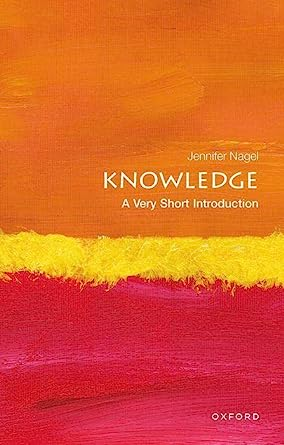
My favorite introduction to traditional epistemology is Jennifer Nagel’s Knowledge, which I use when I teach epistemology at an introductory level and would recommend to those new to the subfield.
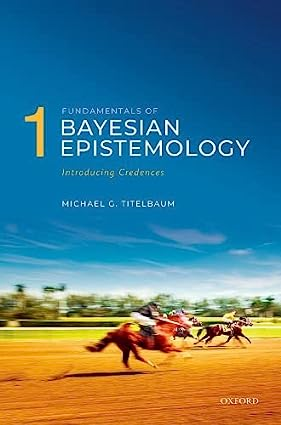
Mike Titelbaum’s Fundamentals of Bayesian Epistemology is an excellent and comprehensive 2-volume set on formal epistemology, which I’d say is at an introductory to intermediate level.
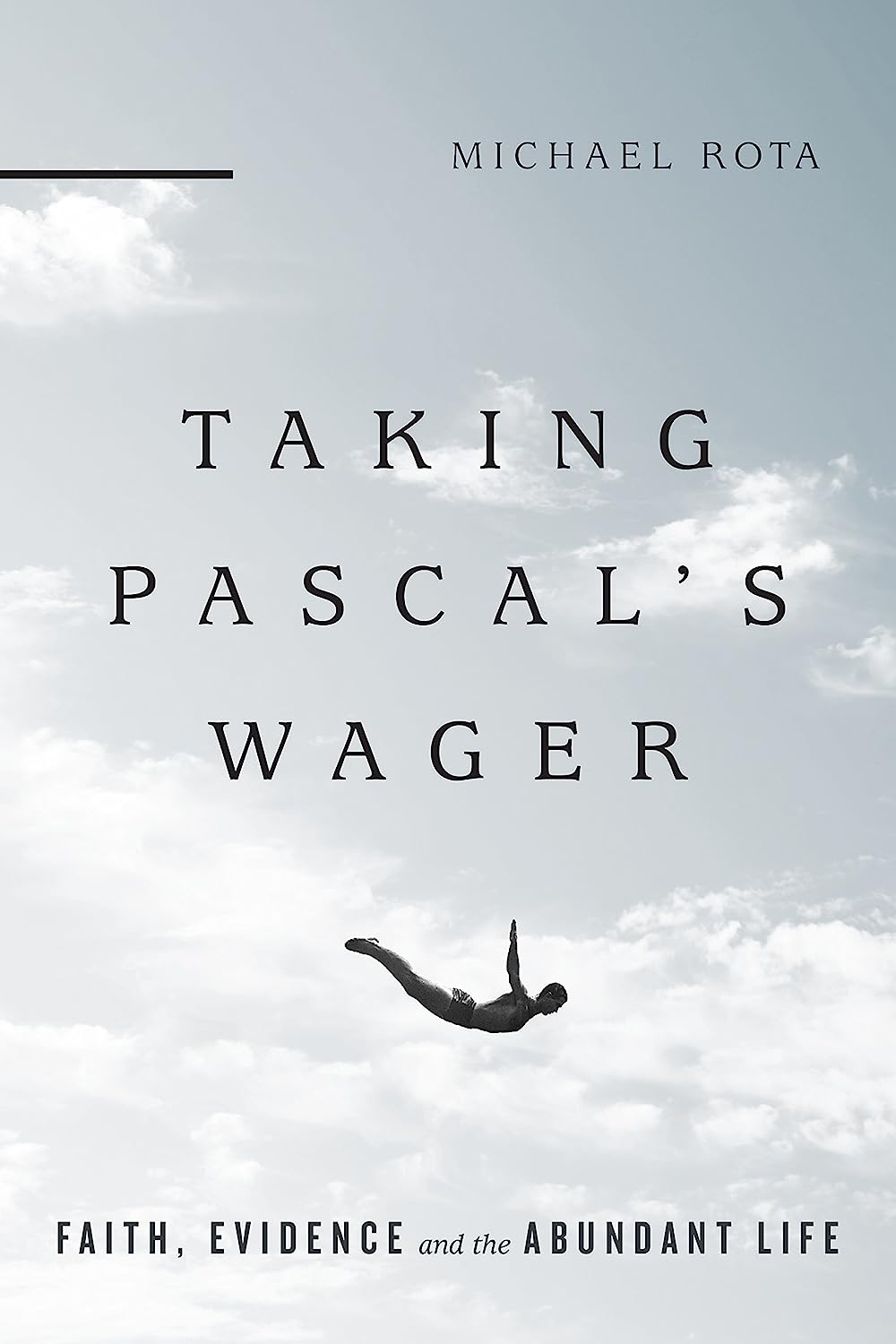
Mike Rota’s Taking Pascal’s Wager is both a helpful intro to decision theory and a great place to start if you’re interested in Pascal's Wager.
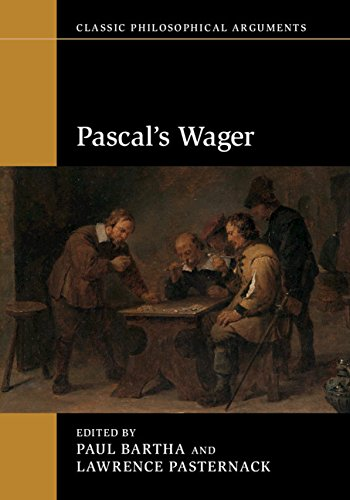
There’s also a relatively recent Cambridge edited volume on Pascal's Wager with some good papers, just called Pascal’s Wager, edited by Paul Bartha and Lawrence Pasternack.
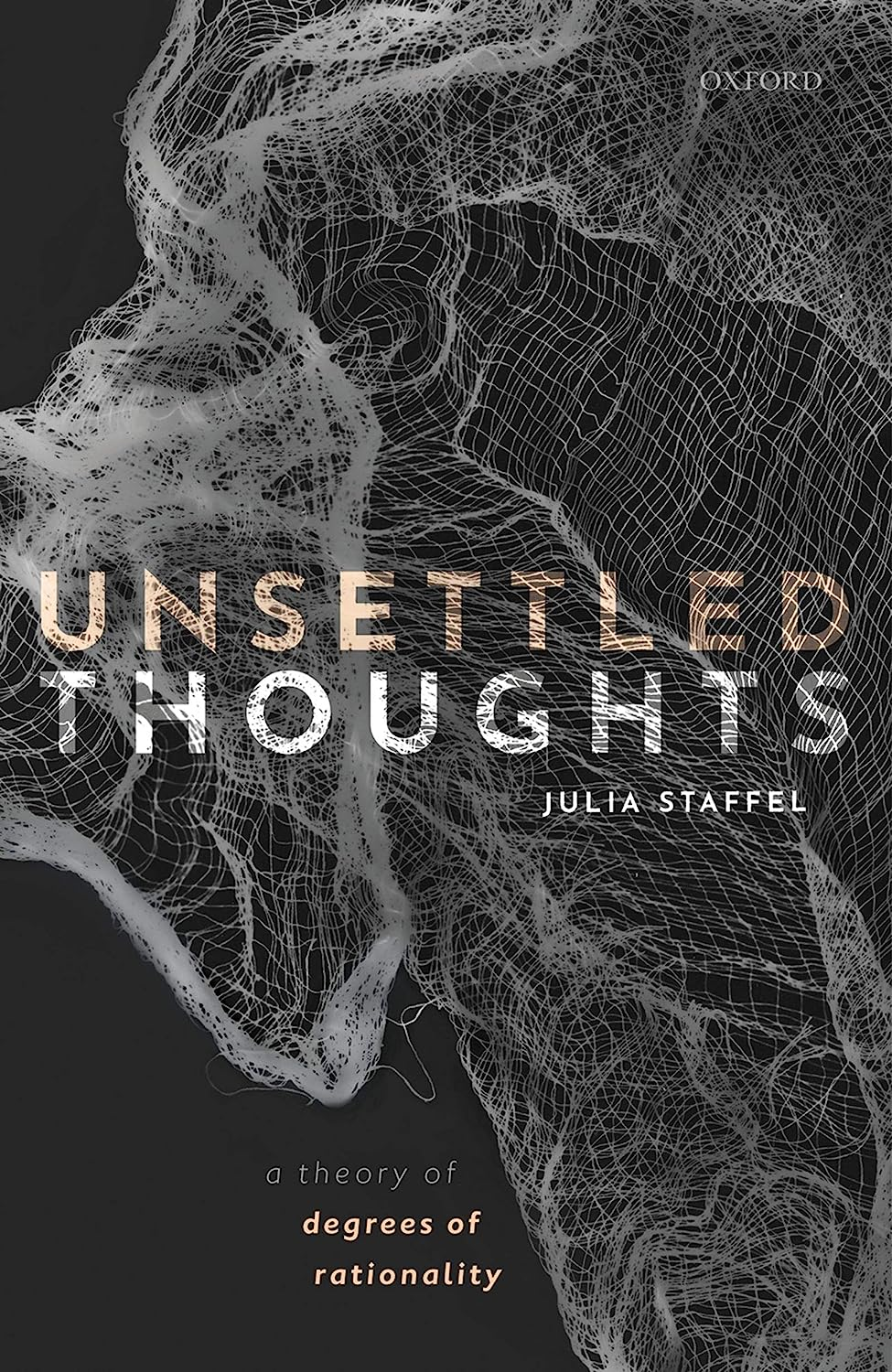
Two more advanced epistemology books I’ve enjoyed recently are Julia Staffel’s book Unsettled Thoughts, which is about epistemic rationality and also covers some cool stuff on beliefs and credences,
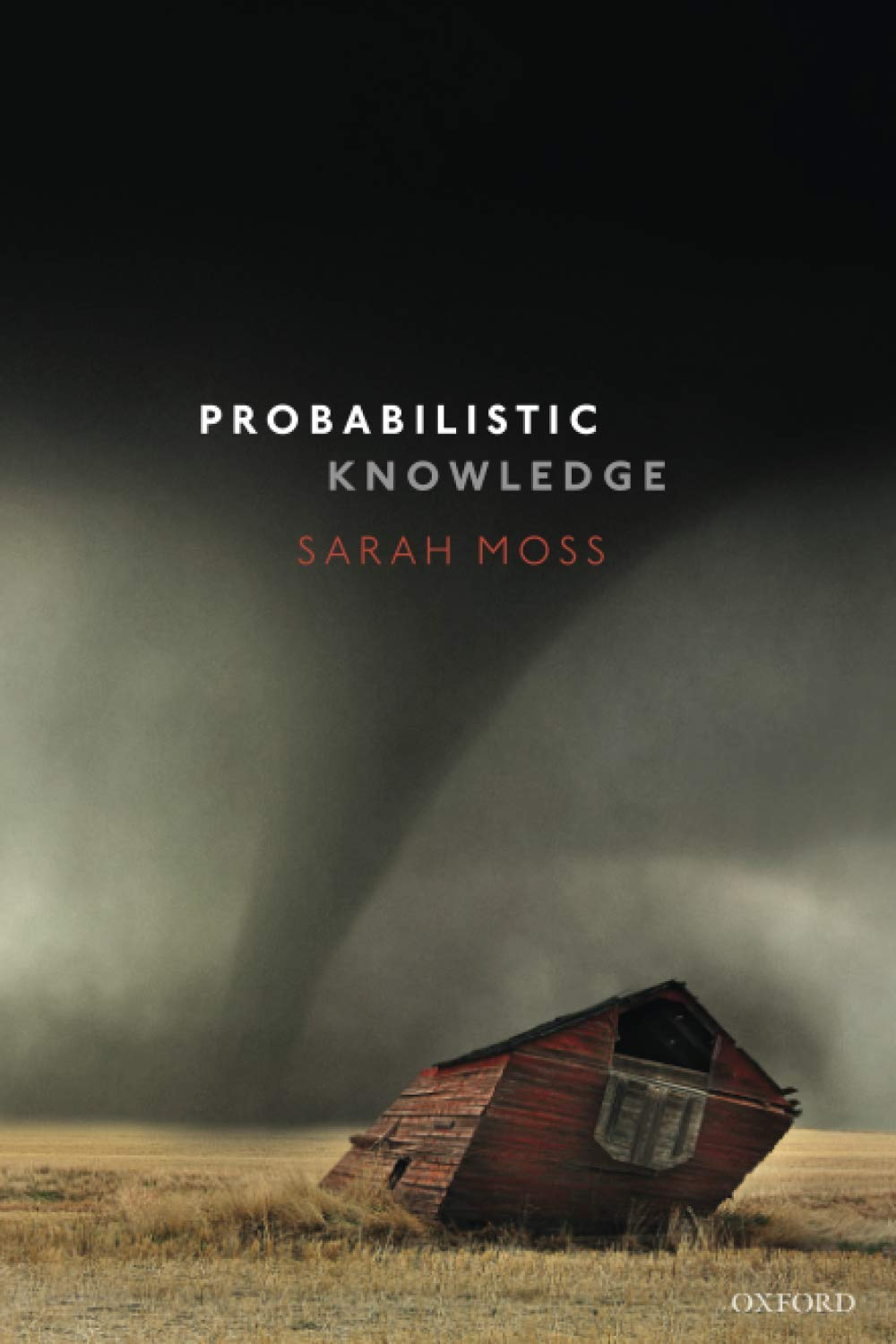
and Sarah Moss’s Probabilistic Knowledge, which defends a unique view of the relationship between belief and credence and addresses the relationship between formal and traditional epistemology (defending, among other things, that credences can be knowledge-like). (I know I know, that was six books, I cheated.)
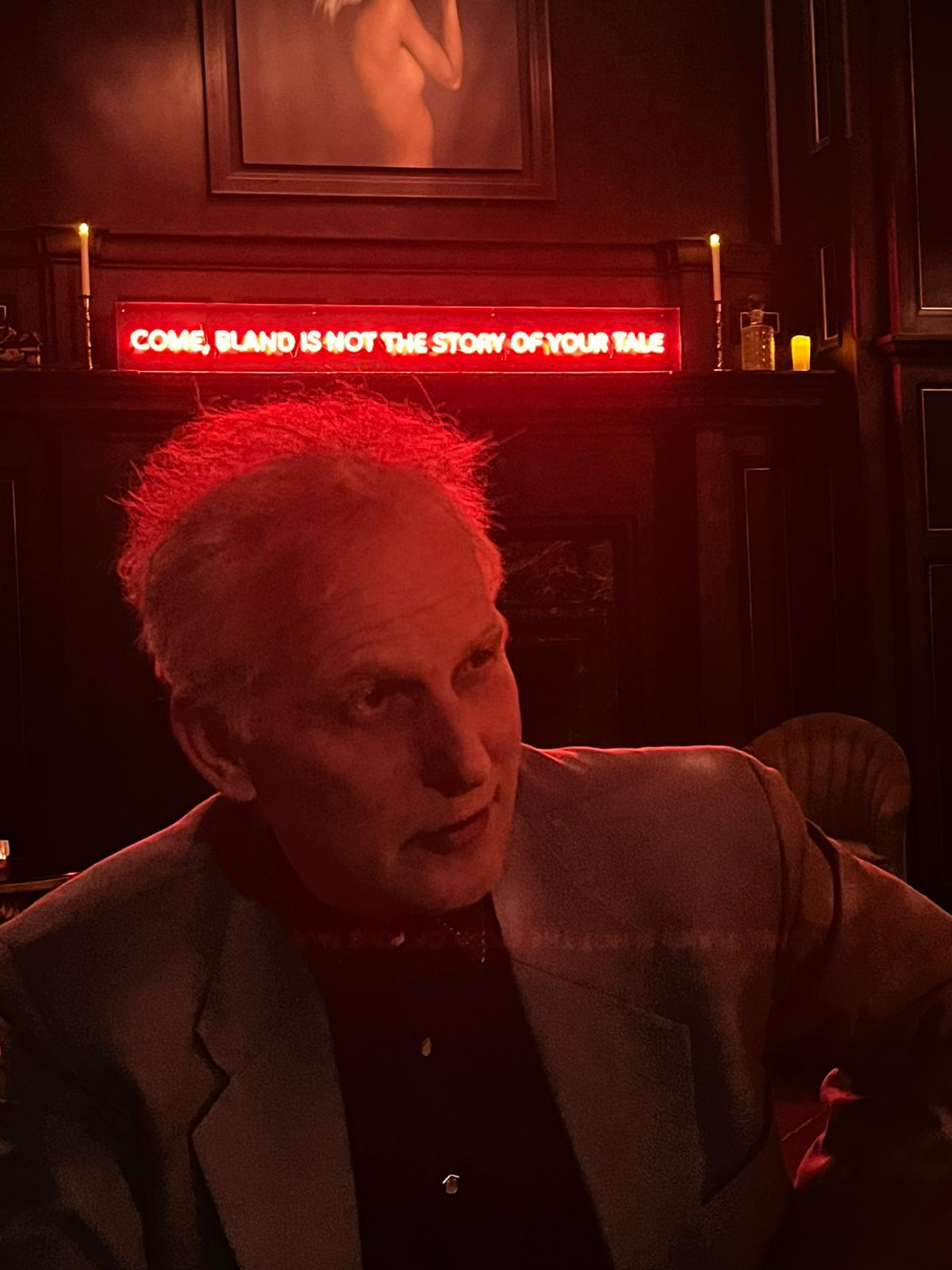
ABOUT THE INTERVIEWER
Richard Marshall is biding his time.
Buy his second book here or his first book here to keep him biding!
End Time series: the themesHuw Price's Flickering Shadows series.
Steven DeLay's Finding meaning series
Josef Mitterer's The Beyond of Philosophy serialised
NEW: Art from 3:16am Exhibition - details here